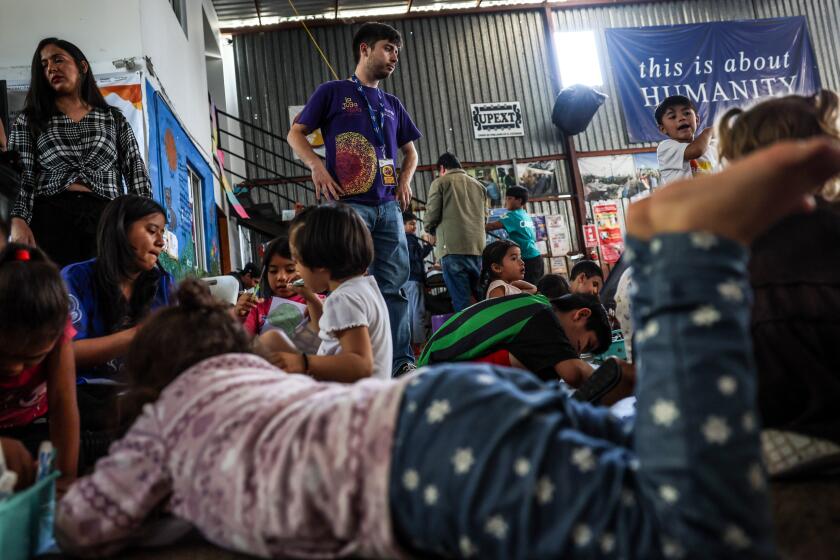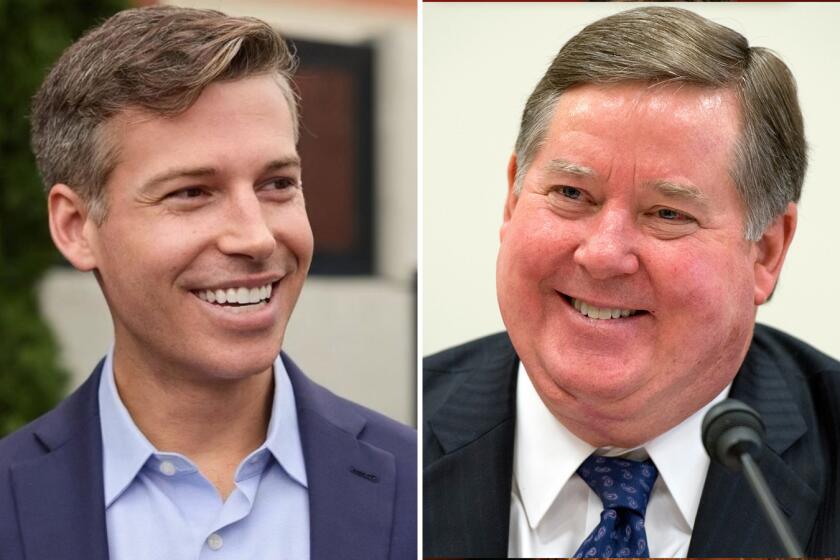California races roiled by border, immigration. It could tip control of the House
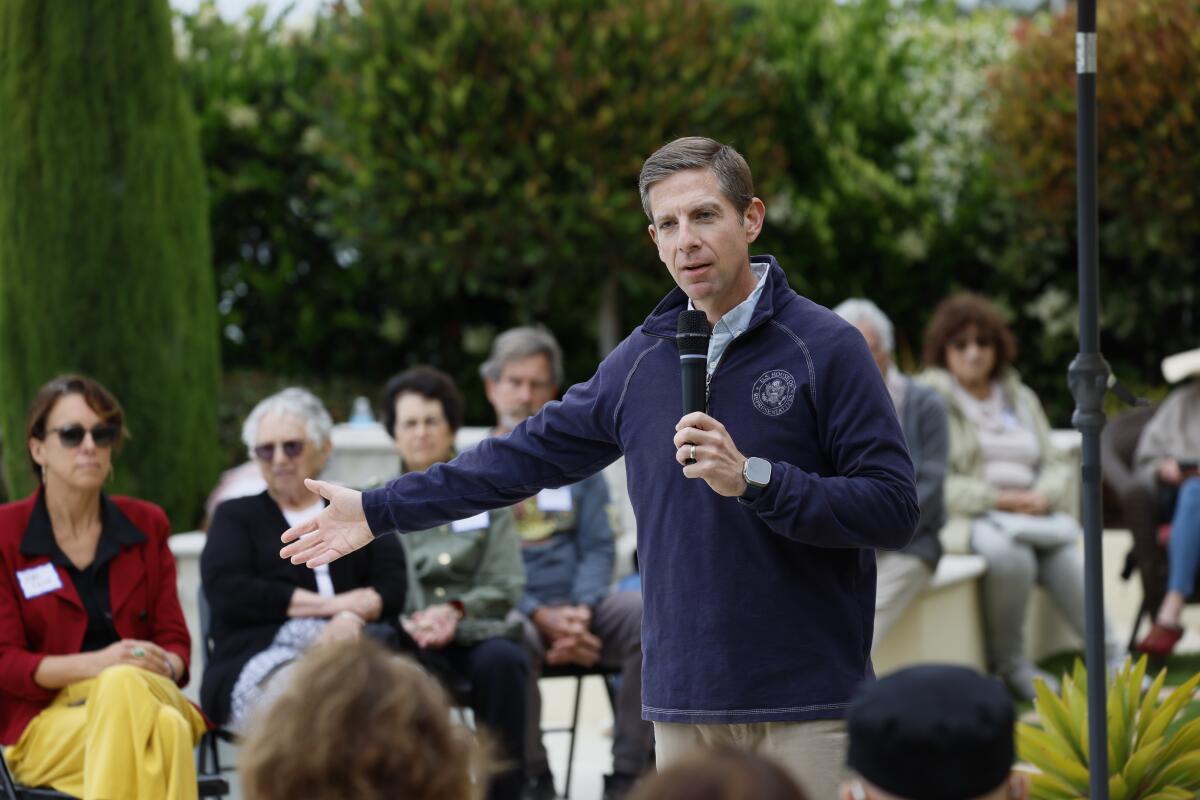
- Share via
ENCINITAS, Calif. — On a recent overcast Saturday in the manicured backyard of a constituent’s home, Rep. Mike Levin (D-San Juan Capistrano) told several dozen supporters about his efforts to bring more sand to local beaches, reduce veteran homelessness and prevent gun violence.
From the crowd, Peggy Aveni whispered to her friend: “What about immigration?” When Levin began taking questions, she immediately raised her hand.
“I am concerned about the immigration thing,” Aveni told him. “I know that the Republicans have tried to squash anything from happening. So, will anything happen before the election?”
How President Biden’s executive order limiting asylum is playing out on the California-Mexico border.
With immigration at the forefront of the presidential election, the U.S.-Mexico border has become an increasingly significant political issue in downballot races. In California, where the San Diego region is now a top destination for arriving migrants, a handful of competitive House races could help determine control of Congress.
A handful of California Republicans appear vulnerable in the November election, including Reps. David Valadao of Hanford and Ken Calvert of Corona, and their defeat could help Democrats reclaim the majority in the House of Representatives.
But there are also Democrats — including Levin — who are clinging to their seats.
“Right now, the border is the No. 1 issue impacting this district,” said Levin’s Republican opponent, retired businessman Matt Gunderson. “The San Diego County line has become the epicenter of border crossings. Until we secure the border, all our other issues, in terms of public safety and public health and inflation, kind of fall to the wayside.”
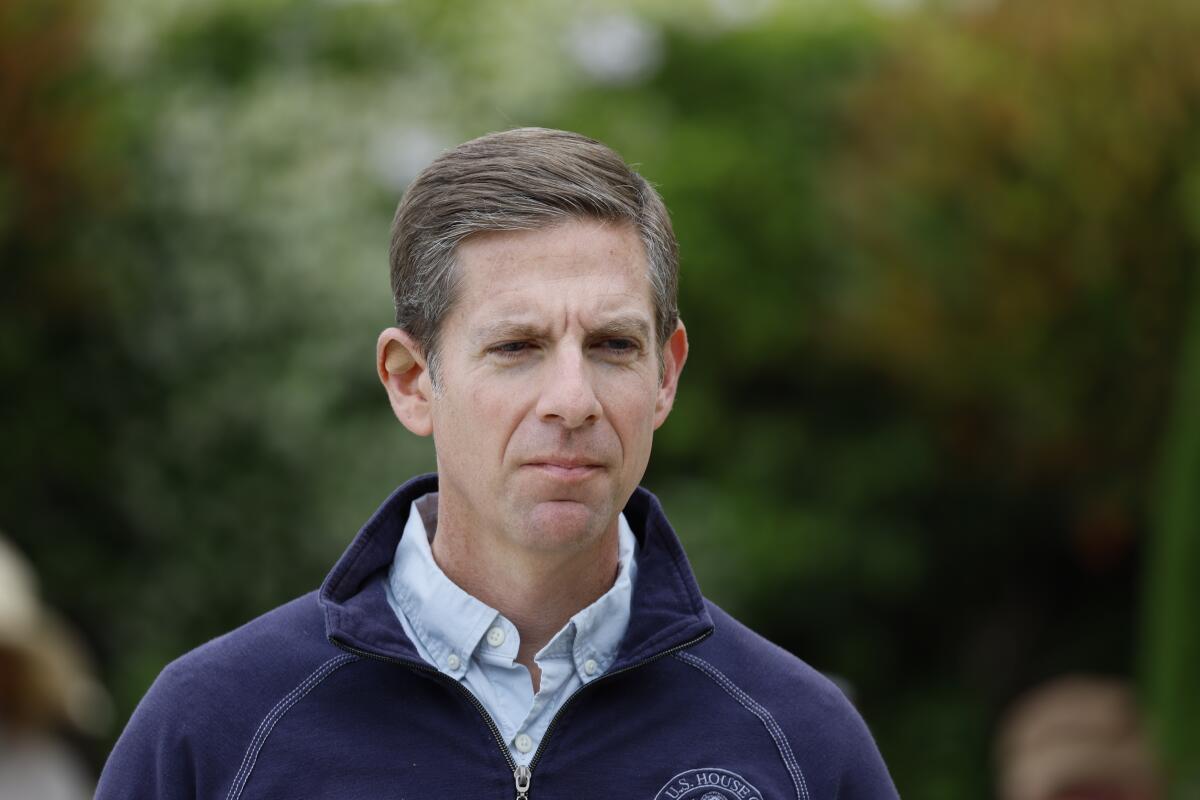
Levin, an environmental lawyer who has served the 49th District in Congress since 2019, represents most of northern coastal San Diego County and parts of southern Orange County. His top priorities are fighting climate change, supporting veterans and protecting democracy, though immigration has increasingly crept up his list.
At the Encinitas campaign event, he told the crowd that the asylum system is broken. It has become easier for people to pay thousands to a cartel or get step-by-step instructions on social media than to enter through a legal pathway, he said.
He reminded them that Republicans, heeding the demands of former President Trump, killed a bipartisan border security bill after months of negotiations. Trump, the presumptive Republican presidential nominee, and conservative news outlets have used the politically divisive issue of immigration as a cudgel to attack President Biden.
“We do have a genuine crisis,” Levin said. “It is not necessarily what Fox News makes it out to be. But it’s unacceptable. It’s untenable.”
Aveni, 70, who is an independent voter, said she supports Levin but found his answer to her question evasive. She said she supports legal immigration.
“My friends in general, even the more liberal ones, understand that this is a big issue for Southern California,” she said. “I want something done, and it’s just too bad that it took three years in the Biden administration to even get there.”
In an interview after the event, Levin said that his grandparents on his mother’s side immigrated from Mexico with their parents, who had work permits. He said their experience might not have been possible today.
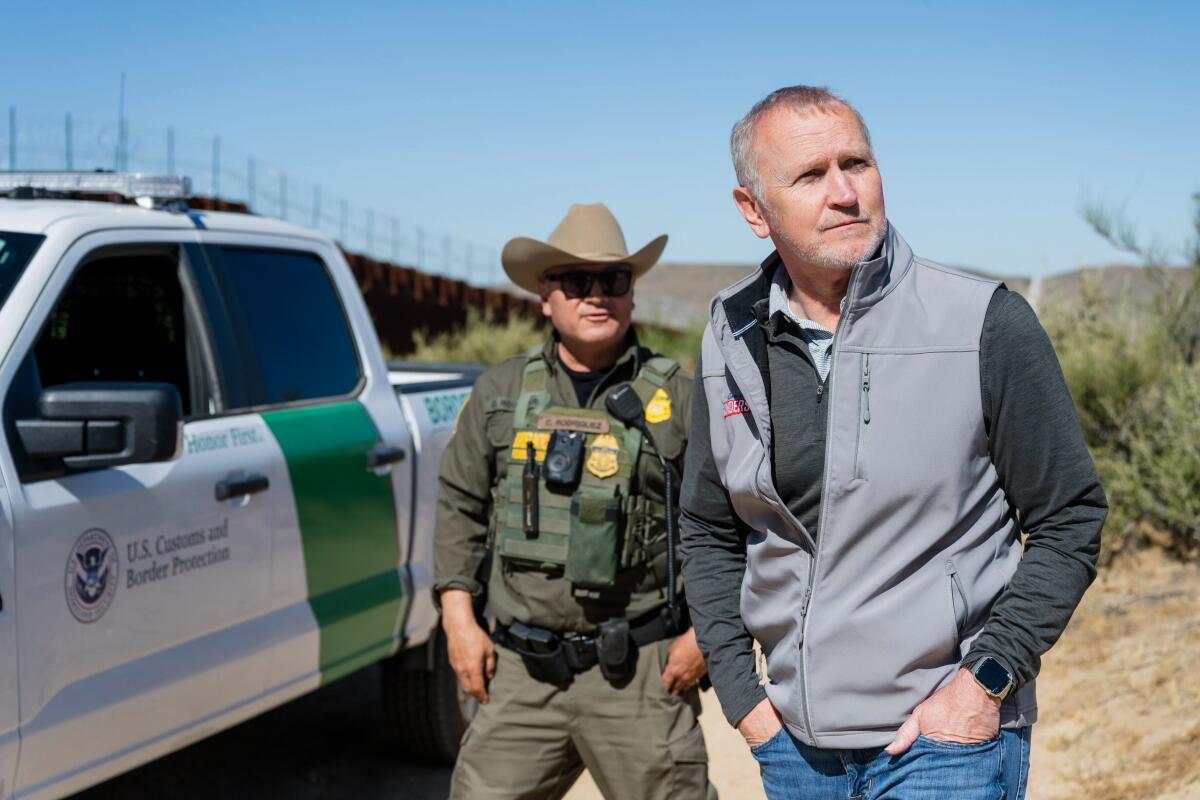
Levin said he wants to expand legal pathways to citizenship, particularly for so-called Dreamers and others who have lived in the U.S. for decades.
The failed border security deal marked the first time most Democrats supported immigration legislation that did not include a legalization component. Still, he said, it was a good-faith negotiation that included necessary funding for more border agents, asylum officers and immigration judges.
“It’s true that it’s a political issue,” he said, but “it is genuinely a national security concern that should be treated as such. For me, that prioritizes where it ranks on the continuum of all the variety of other things that voters may care about.”
At the White House three days after his meet-and-greet, Levin stood near Biden, just behind Homeland Security Secretary Alejandro N. Mayorkas, as the president announced his executive order limiting asylum at the border. The order raises the legal standard for asylum claims and blocks access for those crossing outside legal points of entry when their numbers average more than 2,500 a day.
Asked how he felt about Biden leaning on the same legal provision that Trump used to ban people from several Muslim-majority countries, Levin said he hopes Biden is using it “for far different purposes.” The historic numbers of arrivals in the last few years, he said, show change is necessary.
But Gunderson, Levin’s Republican challenger, said the president’s order had come too late. The former car dealership owner, who ran unsuccessfully for state Senate in 2022, has focused his campaign largely on affordability for the middle class.
The Biden administration dismantled Trump’s border policies just to “inch their way back” as the election nears, Gunderson said.
“No recent ‘come to Jesus’ perspective is going to change what they’ve done over the last three and a half years,” he said.
Immigration is factoring into other California races, too. In the 45th District, Republican Rep. Michelle Steel of Seal Beach faces Democratic challenger Derek Tran, an Army veteran and Orange County business owner whose parents were Vietnamese political refugees.
Tran recently faced heat from Asian American and other community leaders, most of whom endorsed Steel, for telling Punchbowl News that Steel “tries to run on that she’s a refugee” though “she came to this country for economic gain.” Her family fled communist North Korea for Seoul before she later moved to the U.S. for college.
For her part, Steel has criticized Democrats for their handling of the U.S.-Mexico border, saying her constituents had arrived legally.
And in the 41st District, Calvert, the longest-serving Republican member of California’s congressional delegation, faces Democrat Will Rollins, a former federal prosecutor who helped prosecute Jan. 6 insurrectionists.
In a district that sprawls from the Inland Empire into the Coachella Valley, Democratic challenger Will Rollins is hoping to unseat longtime GOP Rep. Ken Calvert.
A redrawing of congressional maps divided the once solidly GOP district in Riverside County. Though both candidates have advocated for securing the southern border, Rollins also supports a path to citizenship for certain immigrants and says those arriving at the border should be treated humanely.
Dave Wasserman, senior editor and elections analyst for the nonpartisan Cook Political Report, said that while immigration has been one of Biden’s weakest issues in approval polls, “Democrats down ballot have been somewhat successful in establishing independence from the White House on this issue.”
The issue has become a lightning rod in districts and states not just along the border, but also across suburbs farther north due to the strain that recent arrivals have placed on municipal budgets, Wasserman said. He pointed to Rep. Tom Suozzi (D-N.Y.), who jabbed at the administration as being slow to respond to the issue, while also blasting Trump and Republicans for sabotaging the bipartisan compromise.
“Generally swing voters are supportive of tightening the border or going further than Biden and Democrats have gone in the last three years,” Wasserman said. “Whereas the focus in 2016 was on Trump’s rhetoric on immigrants and immigration in a way that polarized Hispanic voters against him, the focus now has been on the humanitarian crisis stemming from record numbers of illegal crossings.”
More to Read
Get the L.A. Times Politics newsletter
Deeply reported insights into legislation, politics and policy from Sacramento, Washington and beyond. In your inbox twice per week.
You may occasionally receive promotional content from the Los Angeles Times.
